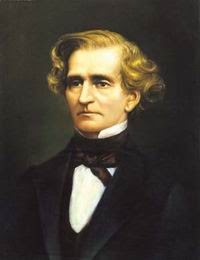| Edit | Map | Home | New Post | New Gallery |
Support
|
 | |
Louis Hector Berlioz (French: Louis Hector Berlioz; December 11, 1803, La Cote-Saint-Andre - March 8, 1869) was a French composer, conductor, and music writer. Member of the Institute of France (1856). He was born in the town of La Cote-Saint-Andre in the south-east of France in the family of a doctor, a free-thinking, educated person. Berlioz spent his childhood in the provinces, where he heard folk songs and got acquainted with ancient myths. He also learned to play the flute there. In 1821, Berlioz moved to Paris, where he began to study medicine, but soon, despite the resistance of his parents, he left medicine, deciding to devote himself to music. He worked by singing in a choir and suffered for a long time. The first public performance of Berlioz's work ("Solemn Mass") took place in Paris in 1825. Berlioz, engaged in self-education, took lessons from Jean-Francois Lesueur for several years and joined his polyphony class after entering the Paris Conservatory in 1826. He also engaged in in the class of Antonin Reicha. Beginning in 1828, Berlioz began writing critical articles about music and became acquainted with writers and musicians popular at the time, such as Victor Hugo, Alexandre Dumas, Paganini, and George Sand. In the years 1828-1830, several works of Berlioz were again publicly performed - the overtures "Waverly", "Francs-juges" and "Fantastic Symphony", after which the public turned their attention to the young composer.
In 1830, Berlioz graduated from the conservatory. In the same year, he received the Rome Prize for the cantata "Sardanapalus". Before that, Berlioz tried to get the prize for 3 years in a row, but the jury refused him because they were confused. In the same year, the revolution began, Berlioz sympathized with the revolutionaries and even played the instrument for the Marseillaise. After that he lived (as a scholar) in Italy. There he became interested in Italian music, met Glinka, got acquainted with the works of Byron. Returning to Paris (1832), he brought with him the overture "King Lear" written in Italy and the symphonic work "Le retour à la vie" in the genre he called "melologue" (a mixture of instrumental and vocal music with recitation), which is a continuation "Fantastic Symphony". Having settled in Paris, Berlioz developed creative activity, worked as a composer, composing program symphonies and operas, a conductor (in particular, he worked at the Paris Conservatory), and a music critic (he wrote in the newspapers "Gazette musicale de Paris", later in the "Journal des Débats" until 1864 year and acquired the reputation of a strict and serious critic). However, his operas were not a serious success and he still remained poor.
In 1839, he was appointed librarian of the conservatory.
Since 1842 he toured abroad a lot. He triumphantly performed as a conductor and composer in Russia (1847, 1867-68), in particular, he gathered a large audience at a concert in the Moscow Arena. In 1867-1867 he lived in St. Petersburg.
In 1856, Berlioz was appointed a member of the Academy of Arts. In the 1860s, Berlioz published collections of articles, as well as his "Memoirs" (1870).
Berlioz's personal life was overshadowed by a series of sad events, which he describes in detail in his "Memoirs" (1870). His first marriage with the Irish actress Harriet Smithson (1833), ended in divorce in 1843 (Smithson suffered from an incurable nervous disease for many years); after her death, Berlioz married the singer Maria Recio, who died suddenly in 1854. The composer's son from his first marriage died in 1867. The composer himself died on March 8, 1869 from nervous exhaustion. Buried at Montmartre Cemetery. |
Author: Sonya Version: 1 Language: English Views: 0
|
Short link: https://www.sponsorschoose.org/a172
Short link to this version: https://www.sponsorschoose.org/n198
Created by Sonya at 2023-05-30 08:42:52
Last modified by Sonya at 2023-05-30 22:00:19
|